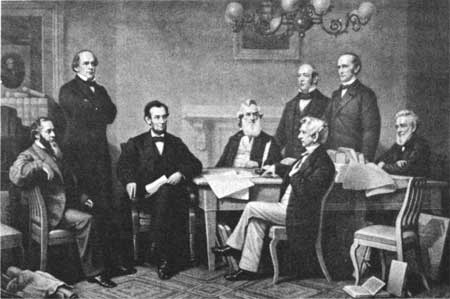|
FORD'S THEATRE National Historic Site |
 |
Lincoln's Life as Depicted in the Museum
Exhibits (continued)

"First Reading of the Emancipation Proclamation
Before the Cabinet." Photograph of the engraving by A. H. Ritchie from
the original painting by F. B. Carpenter, now in the old Supreme Court
chamber of the U. S. Capitol, Washington, D. C.
(Courtesy of the
Library of Congress.)
THE EMANCIPATION PROCLAMATION. On the issue of emancipation, Lincoln's policy, in contrast to that of the radicals, was moderate, aiming at gradual freeing of the slaves by voluntary action on the part of the Stares with Federal compensation to slaveholders. He knew that emancipation without compensation would mean ruin to the economy of the South. He recognized, moreover, that the North shared the responsibility for the existence of slavery and that it was therefore only just that it should participate in the cost of compensation. Hoping against hope that the South would rejoin the Union voluntarily, Lincoln stressed the restoration of the Union as his major war aim, and at first left the question of slavery in abeyance. The desirability of preventing the secession of border States likewise made a policy of emancipation inopportune at the beginning of the war. By the middle of 1862, however, it had become obvious that the enthusiasm of many Northerners for the war was being dampened by the failure to enunciate a definite policy in the controversial matter. Abroad, too, the cause of the Union was suffering for the same reason. A draft emancipation proclamation was read by Lincoln to the Cabinet on July 22, but it was decided to defer announcement until a major victory had been won by the Union forces. Accordingly, after the Confederate reverse at Antietam, Lincoln issued the Preliminary Emancipation Proclamation on September 22, 1862, announcing that all slaves in States still in the Rebellion on January 1 would be declared free, The way was thus still left open for any Confederate State to return to the Union with the institution of slavery unimpaired if they desired to do so. No State availed itself of this opportunity, and on January 1, 1863, the historic Emancipation Proclamation was issued. With its promulgation congressional and popular interest in compensated emancipation, never strong, almost disappeared. Thus the policy governing the freedom of slaves as actually carried out did not embody Lincoln's ideal of voluntary and compensated emancipation.

|
|
Last Modified: Mon, Dec 2 2002 10:00:00 am PDT |


